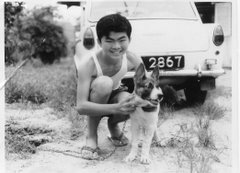
(Left: 1951 photo of our mother with my brother David)
My brother Chun Chew recalls another story ....
Once there was a poor scholar by the name of Lui Man Chui who sold vegetable for a living in Guangzhou. He lived with his childless young wife, in a run-down hut. During the New Year festive season, Lui was in dire financial straits, and was unable to make ends meet. However, he still decided to bring festive cheer to his wife by buying a piece of pork from a certain butcher to celebrate the occasion. Having no money he intended to purchase the piece of pork on credit. The butcher was not around at that time. His assistant took pity on Lui's and allowed him to purchase on credit. So Lui happily went home to surprise his wife with the purchase and the wife did cook up a delicious meat soap dish but without rice to go with.
Meantime, the butcher returned to his stall and found out that his assistant had sold Lui the piece of pork on credit - flew into a terrible rage, scolded his assistant profusely, at the same time marching out to Lui's home. The poor couple were about to consume the soup with the meat, and in came the butcher shouting: "How dare you eat my piece of pork without payment !"
He snatched the piece of pork out of the bowl of soup and hastily rushed out of the hut, but an evil thought struck him - "Hey, wait a minute. I may have retrieved the meat but these two hungry idiots still have soup to drink Really enjoying ha!"
He returned to the hut, marched up to the couple's prayer altar and scooped up some incense ash from the altar incense holder and splashed it into the soup, leaving the poor couple speechless.
Lui was so humiliated that he vowed that should he acquire power one day, he would settle score with this 'sub-human'. Later on, Lui did pass the imperial examination and was promoted to a magistrate in Guangzhou. He returned to his home town with pomp and pageantry, but his wife had already starved to death in the hut - that was why there is a Cantonese saying: "Let your wife starve to death and stench the whole house".
Lui was inflamed with hatred and soon rounded up all the town butchers. He passed a decree that all butchers had to chain one leg to their stall in the course of doing their business, thus making their lives difficult.





7 comments:
Chun See- You should have used a Chinese title for the famous Cantonese saying. My mother told me this story a couple of times, actually reminding me that as a human being we should not be mean, be a moral person, care for others. Here is a true account of mother: When I was a kid, one late night, I heard loud bangs on the door, calling out my mother's name "sam soh, sam soh, open the door quick" Actually the person who knocked the door was a guy nicknamed 'eleven finger or chap yit chai', our kampong hooligan - knocked the door asking my mother to help, because he had committed a crime and the police was after him. He needed some money to run to Malacca. My mother who did not know any legal implication lent or rather gave him $30.00, a tidy sum from her meagre allowance. My mum was a compassionate woman and ever willing to help others, within her means.
I like your stories, please write them more often. These are new to me and I enjoy them a lot.
I'm a fan of your blog and I really think you add a lot of value to the blogging community
You are a great blogger ^_^
I find what Lui did - passing the decree to chain one leg of all butchers to their stalls - was extremely unfair to the butchers who did no wrong. Why punish everyone when only one of them wronged him and his wife? In any case, even if only that wrongful butcher was punished, it would still be considered as abuse of power because Lui was not supposed to take personal revenge using his power as a magistrate. What he did was a gross miscarriage of justice and reflected very badly on himself.
Victor this is but a moral education. I've heard one about how a beatiful but nasty princess got the king to pass a decree asking all the ladies in the vilage to shave their head bald, all because the pricess is going bald herself. Life's never fair one.
Chun See, thanks for the moral education. So what's the moral of the story? Never buy things on credit? Aiyooo.. how to? Got so many credit cards leh. Hee.
Victor presented a very rational and logical point of arguement (in modern context), but we should also understand Lui's predicament. He lived in a very feudal type of society which was controlled by the almighty Emperor and more often corrupted officials, therefore collective punishment was the order of the day. There was no such things as human rights then, that was why Lui suffered in the first place. Because his hatred was so deep, he was resolute to get his enemy's 'pound of flesh' leading him to be blinded to justice.
I think the lesson of the story is not based on the Lui character as a role model but rather how our own mean-ness and hard-heartedness can lead to the suffering of ourselves and those we care for.
Speaking of unfair justice, I am reminded of another story about how this guy was buried alive in a coffin below that of a dead person. I hope Chun Chew can remember the details. I only remember the gross part.
I do not think my mother told the coffin story. Chun See could have heard it from another source, but I really have the urge to tell the Watanable wartime story which my mother related to me. However, I could not piece up the details in a coherent way, whereby confusing the readers. So I decide to put it on hold until my memory is able to rev up.
Post a Comment